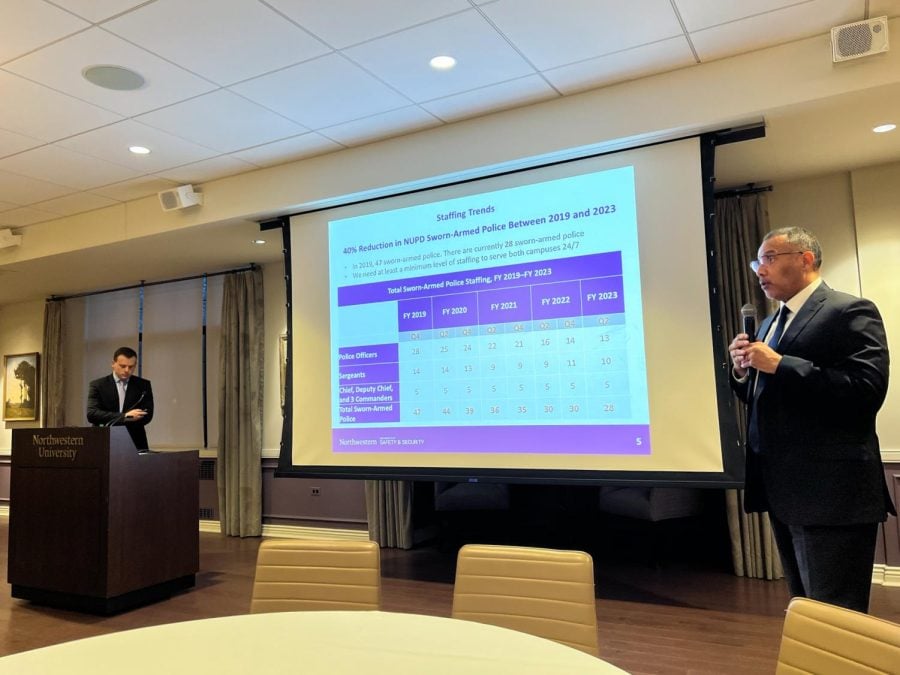Community Safety Advisory Board gives updates on safety protocols at Faculty Senate
Julian Andreone/The Daily Northwestern
The University aims to improve its mental health crisis response with the creation of the Campus Alternative Response Team.
February 9, 2023
Vice President for Operations Luke Figora and University Police Chief of Police Bruce Lewis discussed new safety protocols and plans for a Community Safety Advisory Board successor program during the Faculty Senate meeting Wednesday.
Lewis announced four new CSAB programs: the creation of a new mental health crisis response program called the Campus Alternative Response Team, expansion of non-armed responses to low-risk events, rerouting complaints about UP to an impartial source and reducing the use of racial identifiers in crime reports.
The Campus Safety & Wellness Committee will succeed the CSAB program, which is being dissolved, Figora announced.
CSAB was formed in fall 2020 in response to calls to abolish UP and reform campus safety procedures. The Board has since met with NU community members to discuss UP reforms.
Kellogg Prof. and former CSAB member Therese McGuire complimented the Board’s efforts to work with and understand community members’ concerns when tensions increased between UP and the University after the police murdered George Floyd in 2020.
“By the end, we were having radically constructive and meaningful conversations,” McGuire said. “I was really honored to be part of it.”
UP had 47 sworn police employed in 2019, which has since declined to 28, a 40% decrease. The department is contractually obligated to employ 33 such officers, according to Lewis, and officers are currently working overtime to make up for the shortages.
The decrease is the result of hiring difficulties and UP’s reevaluation of the number of police officers required on campus, Lewis said.
Throughout the meeting, McCormick Prof. Luis Amaral called on Figora and Lewis to incorporate empirical research substantiating the presence of armed security on campus. Amaral said arming more people only increases the risk a community member will be shot.
“I mean, think about Uvalde,” Amaral said. “There were all these armed police around, and what did they do? Nothing.”
While UP will continue employing armed police officers on campus, the department plans to improve its mental health crisis response, according to Lewis and Figora.
NU’s response system for emergency mental health crises currently combines officer-involved responses with support from local nonprofit organization Trilogy Behavioral Healthcare, which provides the University with mental health crisis services during non-business hours.
UP has used Trilogy’s services twice for on-campus incidents, according to Lewis. The crisis intervention response unit arrived within two hours each time, he added.
Lewis said UP is actively searching for a director of CART and will be accepting counselor applications later this month.
Senate President and Medill Prof. Ceci Rodgers said discussions in the Faculty Senate allow community members to learn about and engage with the wide range of perspectives on campus.
“We have a diverse faculty, and it’s good for people who aren’t concerned about the number of police to hear from people who are concerned about the number of police and armed police,” she said.
Email: [email protected]
Twitter: @JulianAndreone
Email: [email protected]
Twitter: @AlbergaSimon
Related Stories:
— Faculty Senate addresses staff hiring, retention issues and fiscal year surplus at Wednesday meeting
— The Daily Explains: University Police investigations of student infractions and criminal offenses


